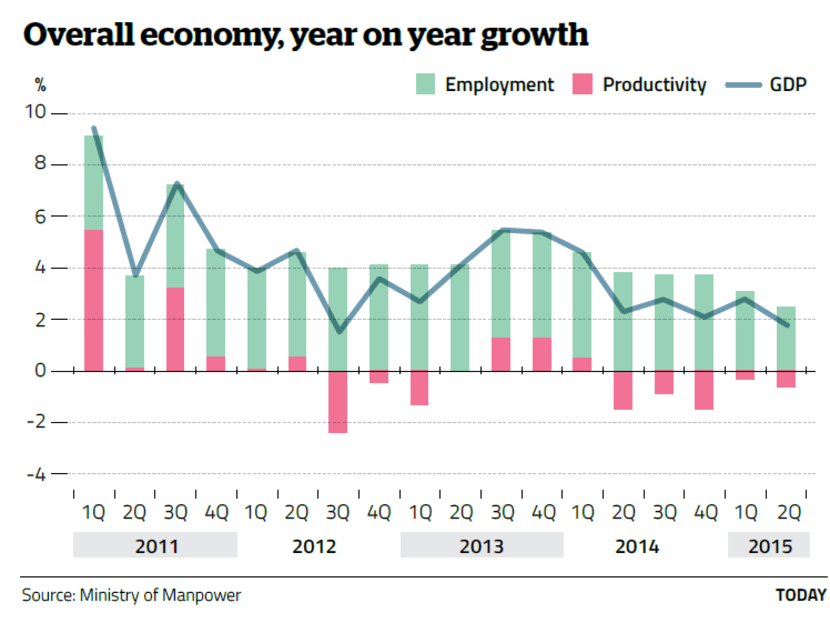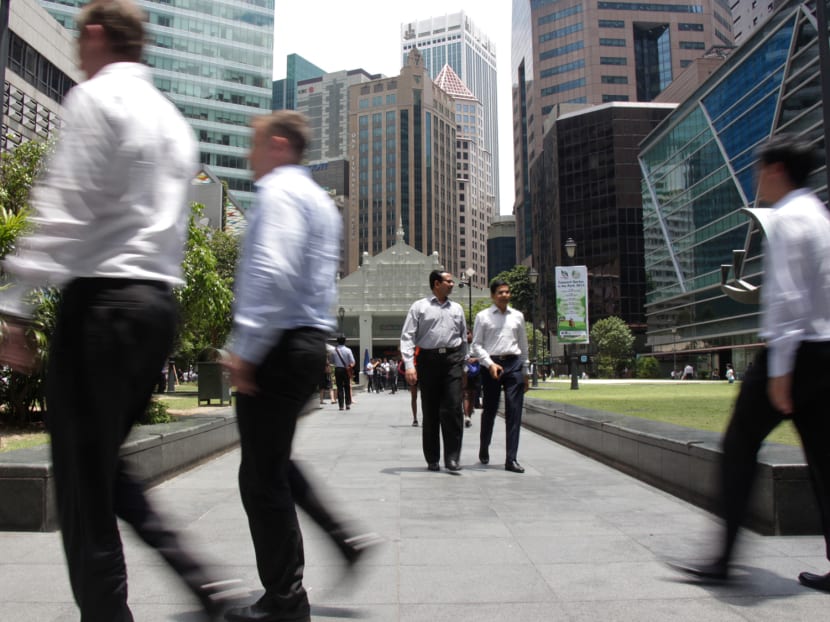Productivity stuck in reverse amid labour crunch
SINGAPORE — The Republic’s employment numbers are falling, in line with the current economic restructuring, but the part of that transition towards a manpower-lean economy driven by productivity is still stuck in reverse.
SINGAPORE — The Republic’s employment numbers are falling, in line with the current economic restructuring, but part of that transition towards a manpower-lean economy driven by productivity is still stuck in reverse.
Despite governmental efforts to boost productivity growth, labour productivity has fallen for the third consecutive six-month period, with the manufacturing, services and construction industries struggling to rise to the challenge of a tighter labour supply.
The latest decline of 0.5 per cent between January and June from the corresponding period last year follows productivity dips of 0.4 per cent and 1.2 per cent in the first and second half of last year, respectively.
In the same period this year, overall employment dipped by 1,000. Local-worker employment fell by 8,900 because of the exit of casual workers aged below 25, and foreign-worker employment rose by 8,000, its lowest half-yearly growth since 2009. This contrasts with the total employment growth of 52,200 in the first half of last year, the Ministry of Manpower’s (MOM) labour market review showed.
Local employment growth is expected to “moderate significantly this year”, given the limits to growing the resident labour force participation rates — among the highest in the world already — and the slower growth of the local working-age population.
While the MOM said in its review today (Sept 15) that firms should “continue to shift towards skills- and capital-intensive ways to grow”, focusing on the quality, rather than the quantity, of their workforce, this is where they have hit a persistent roadblock.
The ministry put the latest productivity declines at 2 per cent for manufacturing and 0.1 per cent for the construction industry. Productivity in the services sector also fell by 0.2 per cent, with accommodation and food services experiencing the sharpest drop: 3.7 per cent.
Singapore’s overall productivity growth “is not likely to see a significant uplift this year”, noted the MOM, which projected that “some consolidation and exit of less-productive businesses is also expected” as the economy restructures.

Human resource experts and economists say the outlook remains bleak, going forward. Randstad Singapore country director Michael Smith said it was “not surprising that employers may be more cautious in their hiring in order to protect themselves against the full impact of economic instability”, given increasing volatility in the global economy.
“As business leaders in Singapore increasingly look to align job scopes and leverage technology to reduce labour costs, it’s important that job seekers and current employees look to upgrade their skills or gain new expertise in order to remain relevant,” he added.
Mr Foo See Yang, acting country manager of Kelly Services Singapore, said companies must be more innovative in sourcing for talent and should seek various talent pools, whether full-time, part-time, flexi-time, freelancers, retirees or interns.
“This ... ensures that Singapore companies have a highly skilled and motivated workforce with the agility to respond to evolving market opportunities,” he said.
Adecco Singapore country manager Femke Hellemons said organisations must look to restructure early to provide for greater productivity.
“Globalisation and the rapid advent of new technology have vastly increased the degree of knowledge and skills needed,” she said, pointing out that the manufacturing sector must move up the value chain, given the greater competition from developing countries in the region.
DBS economist Irvin Seah believes, however, that Singapore is “aiming at the wrong goalpost” with regard to productivity.
As labour productivity here is dependent on gross domestic product (GDP) and labour growth, productivity will get hit as long as GDP goes down, he said, adding that this does not accurately reflect whether a sector has been productive or not.
He suggested more “industry-specific indicators for productivity”, such as sq m per man-day for construction workers, and table turnovers for the food and beverage sector.
Singapore Business Federation chief executive Ho Meng Kit also has some advice, in his case for businesses: “I would encourage companies to go outside of Singapore, where the resources (labour and land) are less constrained and the cost is lower.”
While risks are higher, businesses can step into a much higher growth environment, he said.
As to whether SkillsFuture would make a difference to productivity, independent economist Song Seng Wun said it will take a few years, especially for small and medium enterprises. DBS’ Mr Seah added that while SkillsFuture’s main purpose would not be to boost productivity, it would ensure Singaporeans have the necessary skill sets to hold meaningful jobs instead of paper qualifications being the key determinant.







